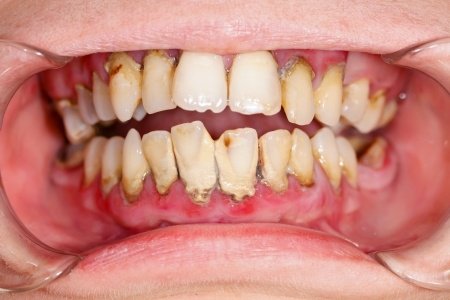Temporomandibular joint disorders (TMJ) often develop symmetrically, in both jaw joints at the same time. However, it is possible for people to develop the disorder and experience symptoms on just one side of the head. However, as the condition progresses, it will likely spread to affect the other joint as well.
There are several causes affecting one-sided jaw pain:
Jaw Trauma
A broken jaw
Jaw trauma can be classified into two types: a broken/fractured jaw or a dislocated jaw.
A broken jaw is a break (fracture) in the jaw bone. A dislocated jaw means the lower part of the jaw has moved out of its normal position at one or both joints where the jaw bone connects to the skull (temporomandibular joints).
A broken or dislocated jaw usually heals after treatment. Nonetheless, patients may develop complications such as the jaw can dislocate out of its usual position, causing teeth crowding (misalignment), swelling or infection of the face and jaw, difficulty eating, difficulty talking, as well as TMJ dysfunctions (ongoing jaw and face pain).
Dental Issues:
Dental problems can often seem like jaw problems. In particular, a visibly damaged tooth will certainly cause cavities, which can result in jaw pain when the tooth deteriorates to a point where the tooth root becomes infected. This infection can spread to tissues in the jawbone which can cause severe pain if left untreated.
To look out for tooth infections that can cause jaw pain, visible signs you can find are damaged or discolored teeth/enamel, sores on your gums, discharge from the tooth and/or gums, and bad breath.
Tooth infections
Adults with growing wisdom teeth can experience jaw pain if they shift their teeth’ alignment or cause unwanted pressure in the jaw. If you are between ages 17 to 25 years, you can feel the wisdom tooth pushing through the very back part of your gums, causing gum and jaw pain.
Sinusitis:
Sinusitis, or commonly called sinus infection, is a medical condition in which the cavities around the nasal passages become inflamed. Acute sinusitis can often be caused by the common cold, a viral infection, which usually resolves on its own. Chronic sinusitis may last up to eight weeks. Both acute and chronic sinusitis require medical treatments such as pain medications, nasal decongestants, and nasal rinses however, chronic sinusitis may require antibiotics in addition as well. Some symptoms can include a stuffy (congested) nose, which can prevent the drainage of your nose’s mucus, headaches and/or facial pains.
Healthy sinus vs. Sinusitis
Your jaw area can become inflamed and in pain when you are suffering from sinus infection. This is likely to happen due to the pressure on your sinus cavity spreading to other areas of your face.
Chronic sinusitis has symptoms that can overlap with TMJ dysfunction, such as:
Headaches
Facial pain or pressure
Jaw pain
Toothache
Neck pain
Ear pain or tinnitus
Dizziness or vertigo
Want to solve your jaw pain issues? Call us now at 02 9558 8988 or email us at info@painfreedentistsydney.com.au to organise a consultation today!


